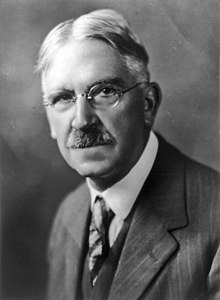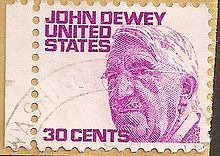Ioannes Dewey
Ioannes Dewey (Burlingtoniae Montis Viridis die 20 Octobris 1859; Novi Eboraci 1 Iunii 1952) fuit philosophus, psychologus, et reformator educationalis Americanus, cuius notiones multum in eruditione et reformatione sociali valent. Qui est unus ex personis maximi momenti cum philosophia pragmatismi consociatis, unusque ex conditoribus psychologiae functionalis habetur. Inspectio generalis in Review of General Psychology anno 2002 edita eum in numero 93 psychologorum citatorum saeculi vicensimi habuit.[1] Dewey fuit nobilissimus intellectualis publicus et maior fautor eruditionis progressivae et liberalismi.[2][3] Quamquam scripturis de eruditione innotuit, de multis rebus aliis scribere solebat, inter quas aesthetica, ars, epistemologia, ethica, logica, metaphysica, theoria socialis.

Obitus: 1 Iunii 1952; Novum Eboracum
Patria: Civitates Foederatae Americae
Familia
Memoria






Praecipua operum Deweyanorum materia est fides profunda in democratia, vel in civilitate, vel eruditione, vel communicatione, vel diurnariorum arte observata. Ipse anno 1888, iam in Universitate Michiganensi laborans, dixit: "Democratia atque unum humanitatis exemplar ultimum et ethicum mea sententia sunt synonyma."[4][5]
Alumnus Universitatis Montis Viridis, professor docuit in universitatibus Chicaginiensi, Columbiae, Michiganensi, Montis Viridis.
Gradus academici honoris causa concessi
recensere- 1946. Doctor honoris causa, Universitas Osloensis
- 1946. Doctor honoris causa, Universitas Pennsylvaniensis
- 1951. Doctor honoris causa, Universitas Yalensis
- 1951. Doctor honoris causa, Universitas Romana apud Sapientiam
Nexus interni
Notae
recensereBibliographia
recensere- Anderson, Douglas R. 1993. The Journal of the American Academy of Religion 61(2).
- Caspary, William R. 2000. Dewey on Democracy. Cornell University Press.
- Haggbloom, Steven J., Jason E. Warnick, Vinessa K. Jones, Gary L. Yarbrough, Tenea M. Russell, Chris M. Borecky, Reagan McGahhey, et John L. Powell III. 2002. The 100 most eminent psychologists of the 20th century. Review of General Psychology 6(2):139–152. doi:10.1037/1089-2680.6.2.139. URL.
- Martin, Jay. 2003. The Education of John Dewey. Novi Eboraci: Columbia University Press.
- Rockefeller, Stephen. 1994. John Dewey: Religious Faith and Democratic Humanism. Novi Eboraci: Columbia University Press
- Rud, A. G., Jim Garrison, et Lynda Stone, eds. 2009. John Dewey at 150: Reflections for a New Century. West Lafayette: Purdue University Press.
- Ryan, Alan. 1995. John Dewey and the High Tide of American Liberalism. Novi Eboraci: W. W. Norton.
- Violas, Paul C., Steven Tozer, et Guy B. Senese. School and Society: Historical and Contemporary Perspectives. McGraw-Hill Humanities/Social Sciences/Languages. ISBN 0072985569.
- Westbrook, Robert B. 1993. John Dewey and American Democracy. Cornell University Press.
Bibliographia addita
recensere- Alexander, Thomas. 1987. John Dewey's Theory of Art, Experience, and Nature. SUNY Press.
- Bernstein, Richard J. 1966. John Dewey. Washington Square Press.
- Boisvert, Raymond. 1997. John Dewey: Rethinking Our Time. SUNY Press.
- Campbell, James. 1995. Understanding John Dewey: Nature and Cooperative Intelligence. Open Court Publishing Company.
- Crick, Nathan. 2010. Democracy & Rhetoric: John Dewey on the Arts of Becoming. University of South Carolina Press.
- Fishman, Stephen M., et Lucille McCarthy. 2007. John Dewey and the Philosophy and Practice of Hope. University of Illinois Press.
- Garrison, Jim. 1997, 2010. Dewey and Eros: Wisdom and Desire in the Art of Teaching. Charlotte: Information Age Publishing.
- Good, James. 2006. A Search for Unity in Diversity: The "Permanent Hegelian Deposit" in the Philosophy of John Dewey. Lexington Books. ISBN 9780739110614.
- Hickman, Larry A. 1992. John Dewey's Pragmatic Technology. Indiana University Press.
- Hook, S. 1939. John Dewey: An Intellectual Portrait.
- Kannegiesser, H. J. 1977. Knowledge and Science. The Macmillan Company of Australia.
- Lamont, Corliss, ed. cum Mary Redmer. 1959. Dialogue on John Dewey. Novi Eboraci: Horizon Press.
- Knoll, Michael. 2014. Laboratory School, University of Chicago. In Encyclopaedia of Educational Theory and Philosophy, vol. 2, ed. D. C. Phillips, 455–458. Londinii: Sage.
- Knoll, Michael. 2014. John Dewey as Administrator: The Inglorious End of the Laboratory School in Chicago. Journal of Curriculum Studies.
- Morse, Donald J. 2011. Faith in Life: John Dewey's Early Philosophy. Fordham University Press.
- Pappas, Gregory. 2008. John Dewey's Ethics: Democracy as Experience. Indiana University Press.
- Pring, Richard. 2007. John Dewey: Continuum Library of Educational Thought.Continuum. ISBN 0826484034.
- Popkewitz, Thomas S., ed. 2005. Inventing the Modern Self and John Dewey: Modernities and the Traveling of Pragmatism in Education. Novi Eboraci: Palgrave Macmillan.
- Putnam, Hilary. 1994. Dewey's Logic: Epistemology as Hypothesis. In Words and Life, ed. James Conant. Cantabrigiae Massachusettae: Harvard University Press.
- Richardson, Henry S. 1998. Truth and ends in Dewey. Canadian Journal of Philosophy 28(Supplement 1):109–147. doi:10.1080/00455091.1998.10717497.
- Rogers, Melvin. 2008. The Undiscovered Dewey: Religion, Morality, and the Ethos of Democracy. Novi Eboraci: Columbia University Press.
- Roth, Robert J. 1962. John Dewey and Self-Realization. Prentice Hall.
- Rorty, Richard. 1982. Dewey's Metaphysics. In The Consequences of Pragmatism: Essays 1972–1980. Minneapoli: University of Minnesota Press.
- Seigfried, Charlene Haddock, ed. 2001. Feminist Interpretations of John Dewey. Pennsylvania State University Press.
- Shook, John. 2000. Dewey's Empirical Theory of Knowledge and Reality. The Vanderbilt Library of American Philosophy.
- Sleeper, R. W. 2001. The Necessity of Pragmatism: John Dewey's Conception of Philosophy. Praefatio Tom Burke. University of Illinois Press.
- Talisse, Robert B. 2007. A Pragmatist Philosophy of Democracy. Routledge.
- Weber, Michel, et Will Desmond, eds. 2008. Handbook of Whiteheadian Process Thought. Francofurti et Lancaster: Ontos Verlag.
- White, Morton. 1943. The Origin of Dewey's Instrumentalism. Novi Eboraci: Columbia University Press.
Nexus externi
recensere| Vicimedia Communia plura habent quae ad Ioannem Dewey spectant. |
- Center for Dewey Studies.
- John Dewey Papers, 1858–1970. Southern Illinois University Carbondale, Special Collections Research Center.
- John Dewey Chronology at Southern Illinois University.
- Opera auctore "John Dewey" apud gutenberg.org reperta.